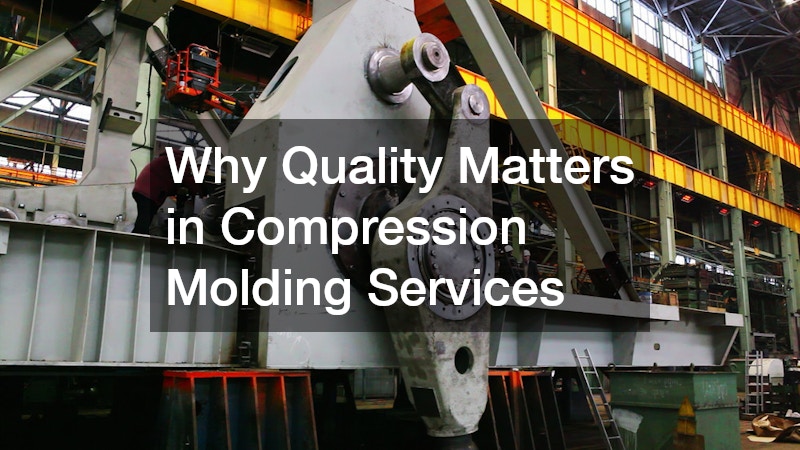Compression molding services are critical to the manufacturing industry, providing essential components for a wide variety of products. Ensuring quality in these services is crucial for maintaining the integrity, performance, and longevity of the products being manufactured. In this article, we will cover why quality matters in compression molding services, addressing the most frequently asked questions and concerns.
How does the quality of compression molding affect overall product performance?
Impact on Durability and Lifespan
Quality in compression molding directly correlates to the durability and lifespan of the manufactured products. When manufacturers invest in high-quality materials, the resulting products typically exhibit superior resistance to environmental and mechanical stresses.
Poor quality can result in defects that reduce the product’s resilience to wear and tear. For instance, improperly cured materials may cause the final product to become brittle, leading to premature failure under operational stresses.
The implementation of robust quality practices in compression molding can significantly enhance product longevity. Manufacturers can avoid costly recalls and customer dissatisfaction by ensuring the integrity of their molded components.
Influence on Product Functionality
High-quality compression molding ensures that products function as intended, meeting the necessary specifications and standards. Consistent quality control measures ensure that each component manufactured adheres strictly to dimensional tolerances, enabling seamless fit and function in the final assembly.
This includes precision in measurements and the absence of manufacturing defects. Such precision is crucial to maintaining product features like mechanical strength, thermal stability, and chemical resistance, which are vital for specific industry applications.
Failure to maintain required quality standards in compression molding can lead to issues such as leaks, misalignments, or structural weaknesses. As a result, products may not perform optimally, which can have a ripple effect on the entire system in which they are used.
What are the cost implications of quality in compression molding services?
Long-term Cost Savings
Investing in quality up front can lead to considerable long-term savings as it minimizes defects, returns, and the need for rework, thus reducing waste and improving efficiency. A focus on quality helps prevent the production inefficiencies that result from faulty molds and components.
This commitment to quality ensures that companies can reduce operational costs significantly by minimizing production downtime and product recalls. The cumulative effect of these reductions in cost avoids significant disruptions and maintains brand reputation.
Furthermore, companies that consistently deliver quality products through superior compression molding services are more likely to secure repeat business, thus enhancing their market position and competitive edge. The stability provided by reliable, high-quality product offerings cannot be underestimated in building a loyal customer base.
Initial Investment vs. Quality Return
The initial costs of high-quality compression molding might be higher, but this investment pays off in fewer defects and lower maintenance costs throughout the product’s lifecycle. Superior materials and precision engineering can significantly extend the life and functionality of molded components.
The timeframe for realizing a return on this investment is often shorter than anticipated, as high-quality components tend to require less post-production intervention. This presents an opportunity for manufacturers to not only reclaim initial costs but also increase profitability over time.
In the competitive landscape of manufacturing, companies that prioritize quality in compression molding have a distinct advantage. They foster innovation while reducing the likelihood of costly failures and ensuring products meet customer and regulatory expectations.
How does quality control in compression molding ensure compliance with industry standards?
Adherence to Industry Regulations
Ensuring quality in compression molding includes adherence to strict industry regulations and standards, which guarantee product safety and compliance. Compliance is mandatory in sectors such as automotive, aerospace, and healthcare, where the stakes of product failure are incredibly high.
By adhering to relevant industry standards, companies demonstrate their commitment to safety and performance, building trust with customers and stakeholders. Compliance with these regulations also reinforces a company’s legal position, preparing it adequately against any potential liability claims.
In the context of compression molding, maintaining regulatory compliance requires consistent monitoring and documentation throughout the production process. This attention to detail prevents regulatory lapses, which can incur financial penalties and damage corporate reputation.
Role of Quality Assurance Processes
Implementing robust quality assurance processes helps in identifying and correcting issues early on, thus ensuring compliance and maintaining high standards in production. Regular audits and inspections are integral to ensuring that molding processes continue to meet quality criteria.
These processes involve systematic testing and analysis, enabling manufacturers to catch defects before final products reach the market. This proactive approach not only ensures alignment with quality objectives but also fortifies a company’s capability to deliver excellence consistently.
Incorporating quality assurance processes into compression molding flows fosters an environment of continuous improvement. Feedback loops identify areas for enhancement, allowing companies to refine both their products and their manufacturing techniques over time.
Quality in compression molding services plays an essential role in product performance, cost management, and compliance with industry standards. By focusing on quality, manufacturers can produce more reliable and durable products, leading to customer satisfaction and business success.



